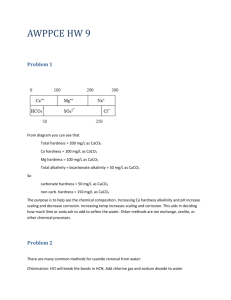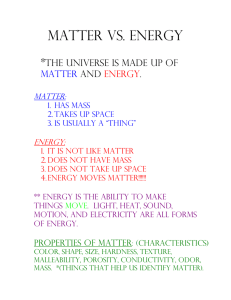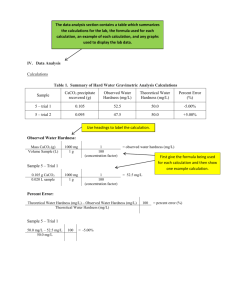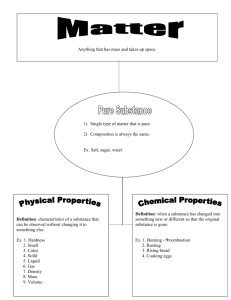Hard Water - Government of Nova Scotia
advertisement
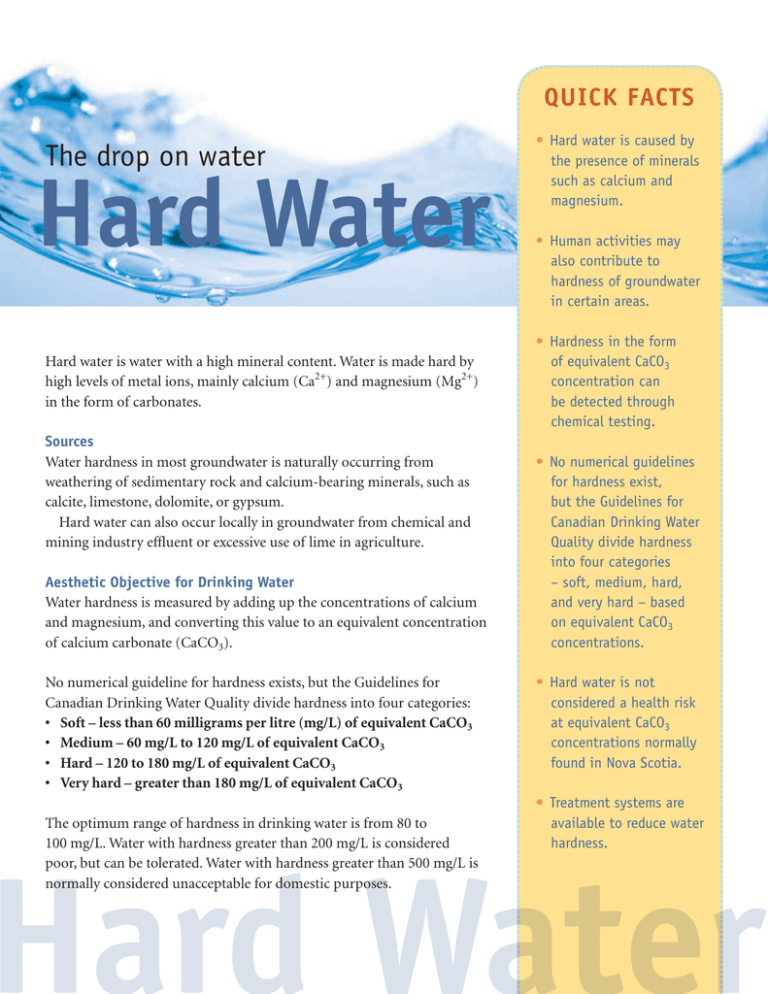
QUICK FACTS The drop on water Hard Water Hard water is water with a high mineral content. Water is made hard by high levels of metal ions, mainly calcium (Ca2+) and magnesium (Mg2+) in the form of carbonates. Sources Water hardness in most groundwater is naturally occurring from weathering of sedimentary rock and calcium-bearing minerals, such as calcite, limestone, dolomite, or gypsum. Hard water can also occur locally in groundwater from chemical and mining industry effluent or excessive use of lime in agriculture. Aesthetic Objective for Drinking Water Water hardness is measured by adding up the concentrations of calcium and magnesium, and converting this value to an equivalent concentration of calcium carbonate (CaCO3). No numerical guideline for hardness exists, but the Guidelines for Canadian Drinking Water Quality divide hardness into four categories: • Soft – less than 60 milligrams per litre (mg/L) of equivalent CaCO3 • Medium – 60 mg/L to 120 mg/L of equivalent CaCO3 • Hard – 120 to 180 mg/L of equivalent CaCO3 • Very hard – greater than 180 mg/L of equivalent CaCO3 The optimum range of hardness in drinking water is from 80 to 100 mg/L. Water with hardness greater than 200 mg/L is considered poor, but can be tolerated. Water with hardness greater than 500 mg/L is normally considered unacceptable for domestic purposes. • Hard water is caused by the presence of minerals such as calcium and magnesium. • Human activities may also contribute to hardness of groundwater in certain areas. • Hardness in the form of equivalent CaCO3 concentration can be detected through chemical testing. • No numerical guidelines for hardness exist, but the Guidelines for Canadian Drinking Water Quality divide hardness into four categories – soft, medium, hard, and very hard – based on equivalent CaCO3 concentrations. • Hard water is not considered a health risk at equivalent CaCO3 concentrations normally found in Nova Scotia. • Treatment systems are available to reduce water hardness. Hard Water Hard Water Health Risks Hard water is not a health risk. It is mainly an aesthetic concern, because of the taste that a high concentration of calcium and other ions give to water. Hard water also reduces the ability of soap to produce a lather and causes scale formation in pipes, on plumbing fixtures, and in heating systems. In agricultural areas where lime and fertilizers are applied to the land, excessive hardness may indicate the presence of other chemicals such as nitrate. In very rare cases where CaCO3 concentrations in drinking water are greater than 1000 mg/L, hard water has been associated with an increased incidence of gallstones and kidney stones. Testing Regularly test your well water for a standard suite of chemical parameters, including hardness. Use an accredited water testing laboratory. Find a list of accredited water testing laboratories at www.gov.ns.ca/nse/water/ waterlabs.asp or see the Yellow Pages under “laboratories.” Get the special sampling bottles and instructions on proper sampling from the laboratory. The cost of analyzing water samples can range from $15 for a single parameter to $230 for a full suite of chemical parameters. The cost can vary depending on the lab and the number of parameters being tested. REGULAR TESTING Homeowners are responsible for monitoring the quality of their well water: • Test for bacterial quality every 6 months. • Test for chemical quality every 2 years. • Test more often if you notice changes in physical qualities – taste, smell, or colour. Regular testing alerts you to problems with your drinking water. H Solutions If well water is found to be excessively hard (greater than 180 mg/L of CaCO3), get a second test to confirm the original results. Hardness is an aesthetic parameter. Aesthetic parameters may impair the taste, smell, or colour of water. Although hardness does not pose a health risk at levels normally found in well water, it can affect the function and lifetime of the plumbing system and appliances. If excessive hardness is confirmed (greater than 180 mg/L of CaCO3), treating your water is optional. You may choose to treat your water to • improve the taste and make it more pleasing to consume • increase the ability of soap to produce a lather • decrease scale formation on well and plumbing materials as well as appliances Treatment The most common treatment method to reduce hardness in drinking water is ion exchange (water softener). Ion exchange works by pumping water through a tank containing a resin. This causes calcium and magnesium ions to be exchanged for sodium or potassium ions. This increases the concentration of sodium or potassium in the water. Another effective treatment method is reverse osmosis. Buy a treatment system that has been certified to meet the current NSF standards for hardness reduction. NSF International is a not-for-profit, non-governmental organization that sets health and safety standards for manufacturers in 80 countries. See its website at www.nsf.org. Once installed, re-test your water to ensure the treatment system is working properly. Maintain the system according to the manufacturer’s instructions to ensure a continued supply of safe drinking water. For more information on water treatment, see our publications Water Treatment Options and Maintaining Your Water Treatment, part of the Your Well Water booklet series at www.gov.ns.ca/nse/water/ privatewells.asp. Hard Water Hard Water Considerations for ion exchange (water softener) method An increase in sodium concentration may be a concern to those on sodium-reduced diets. See our fact sheet on sodium for more information. An increase in potassium may cause adverse health effects to those with kidney dysfunction or those taking medications that interfere with normal potassium-dependent functions in the body. See our fact sheet on potassium for more information. The Guidelines for Canadian Drinking Water Quality recommend that if you use ion exchange (water softener) for treatment, keep a separate, non-softened water supply for drinking and cooking. FOR MORE INFORMATION Contact Nova Scotia Environment at 1-877-9ENVIRO or 1-877-936-8476 www.gov.ns.ca/nse/water/ Environment 03.2008
